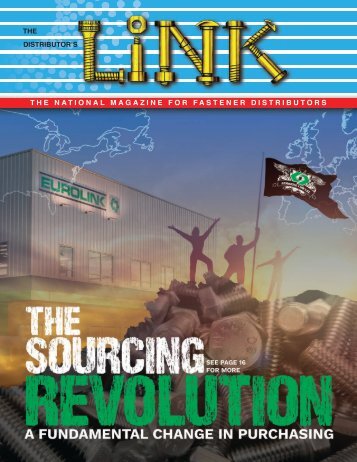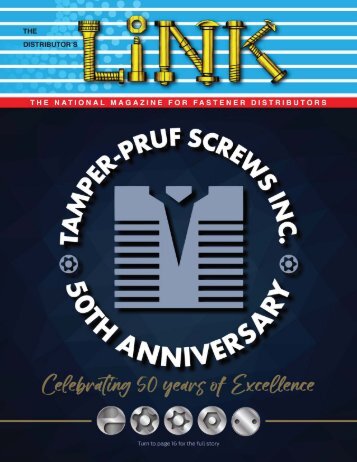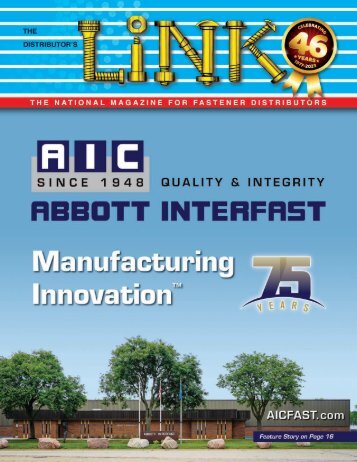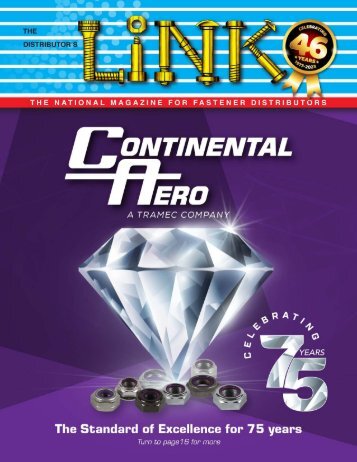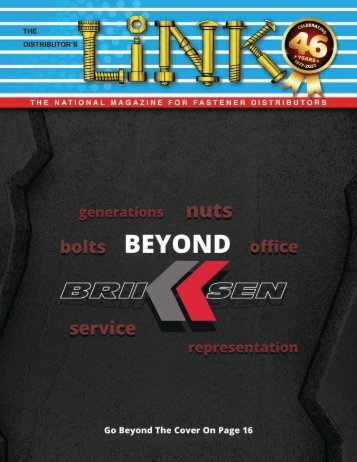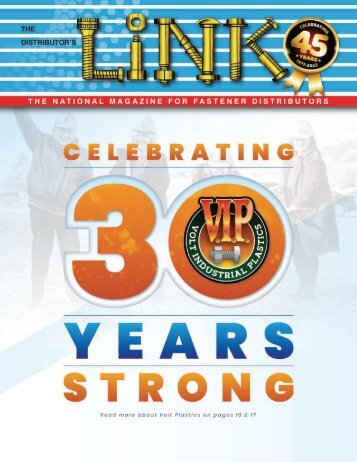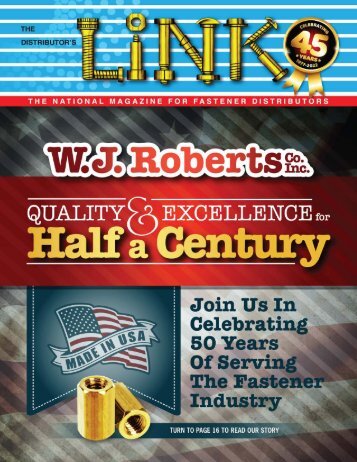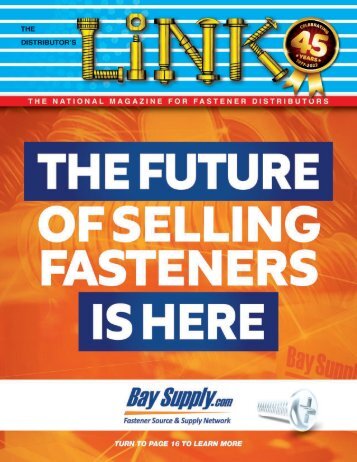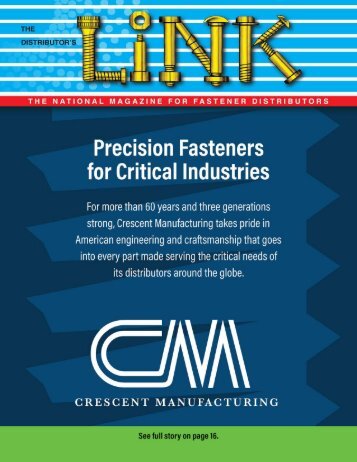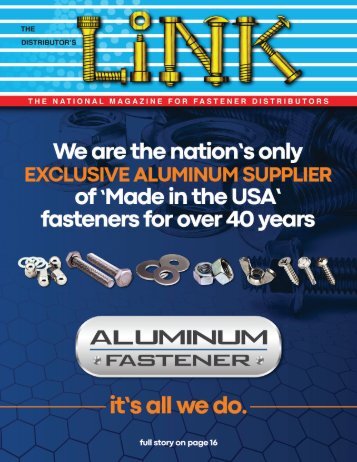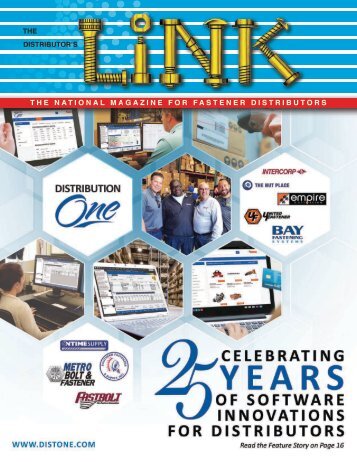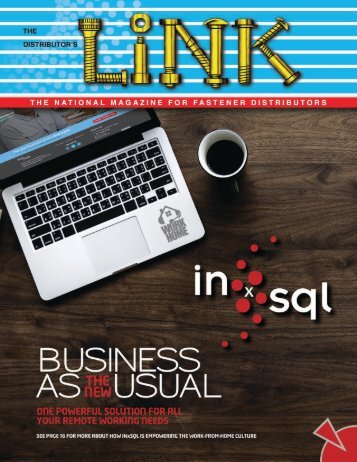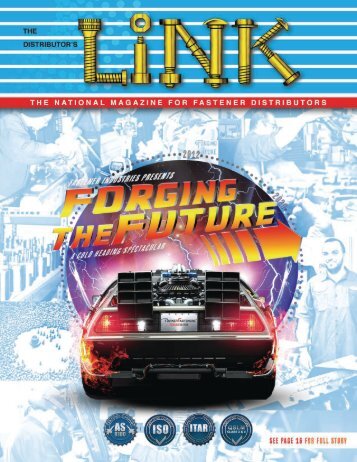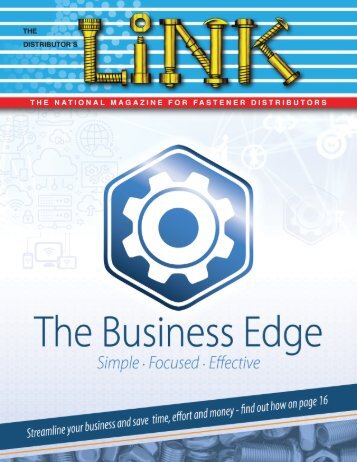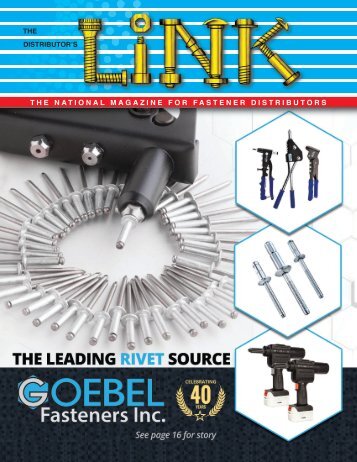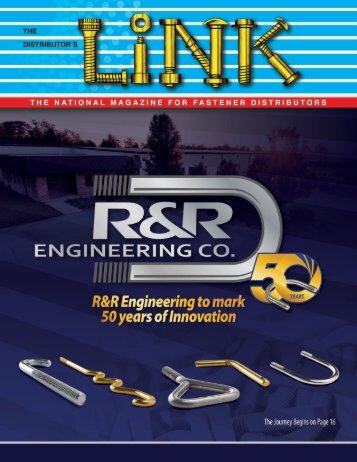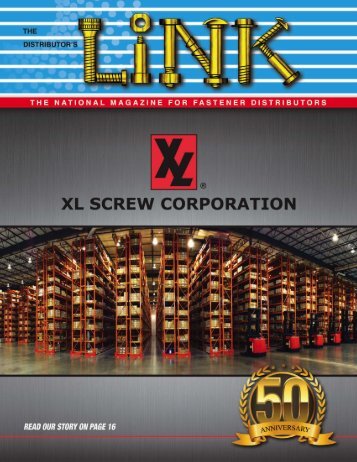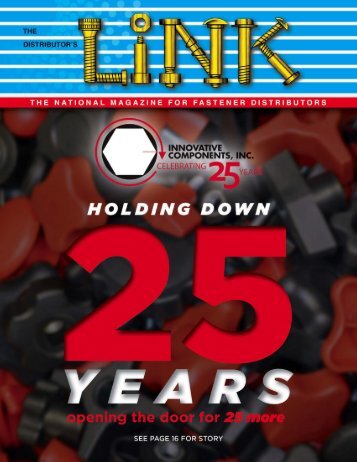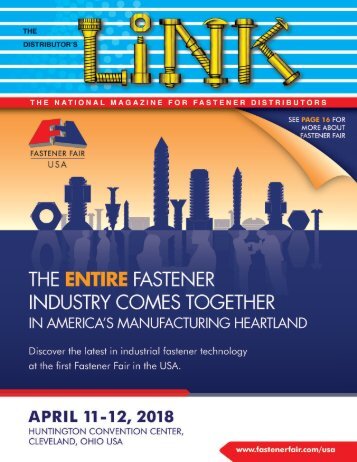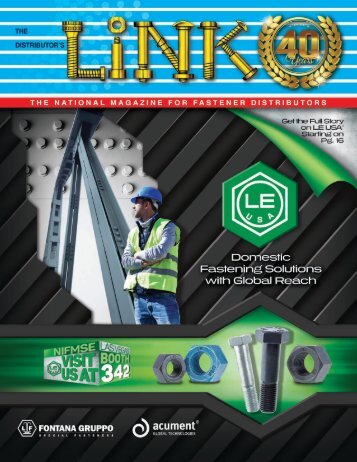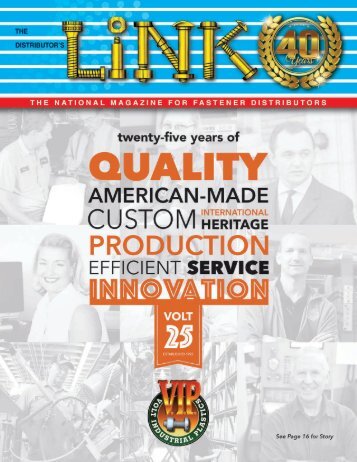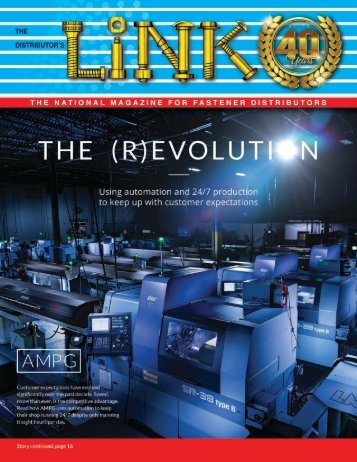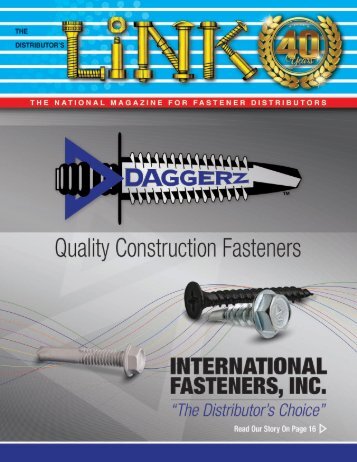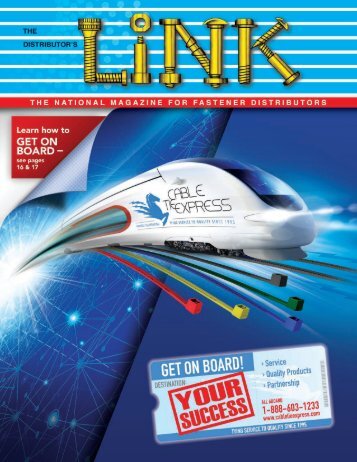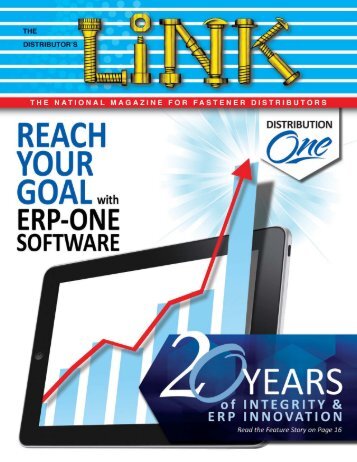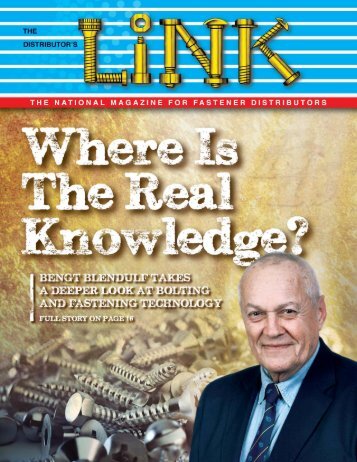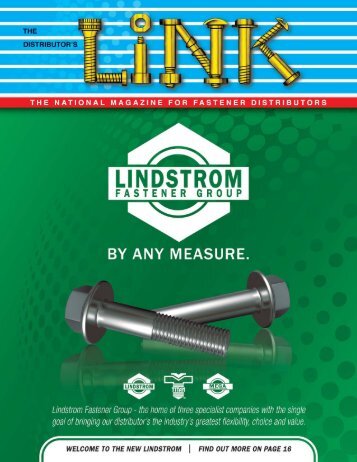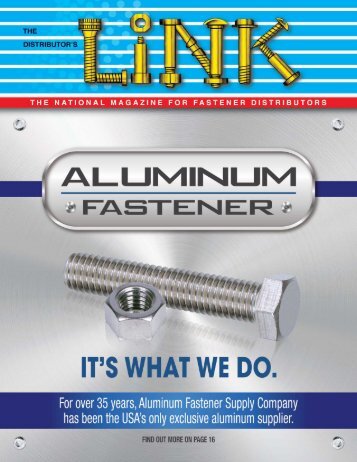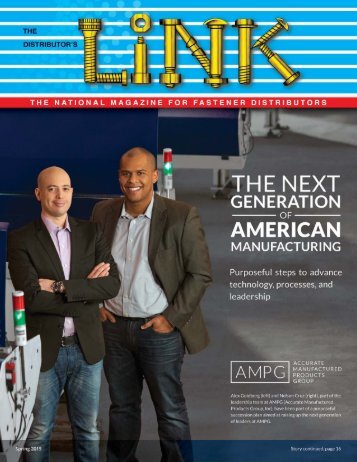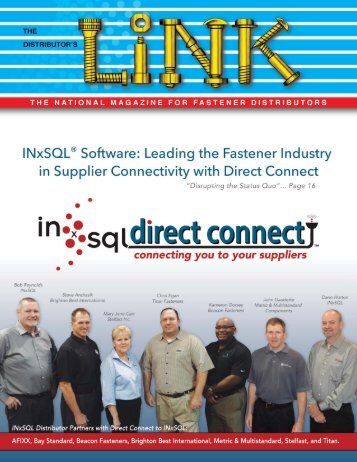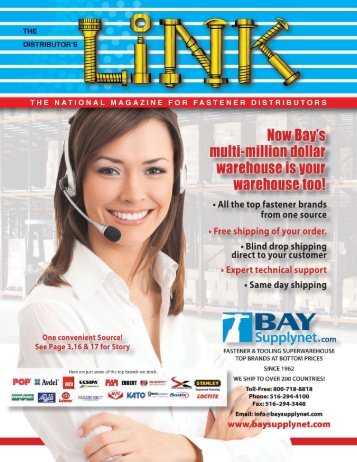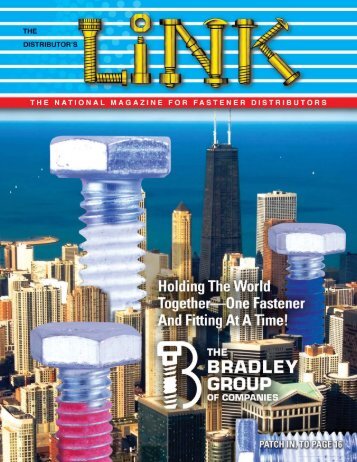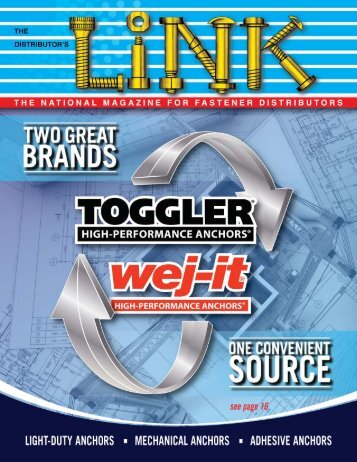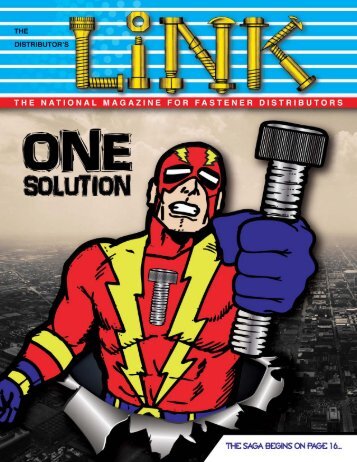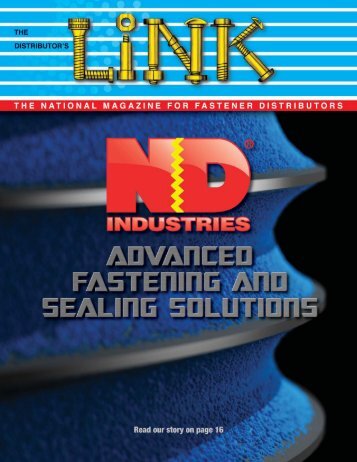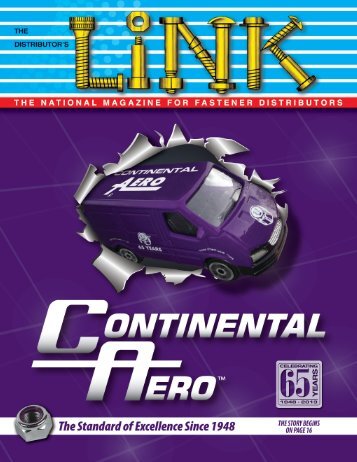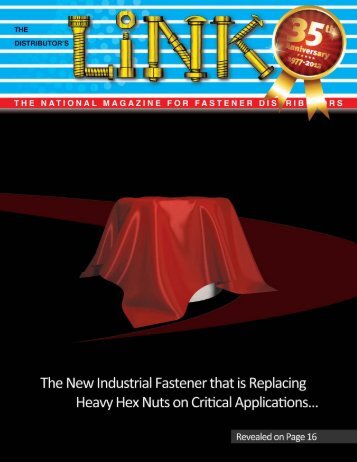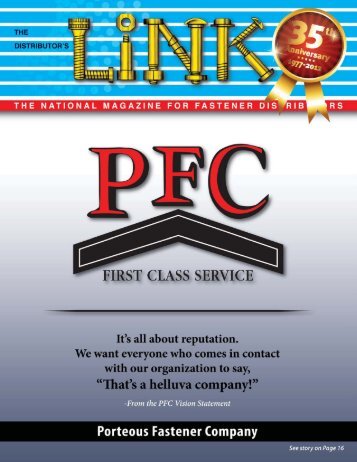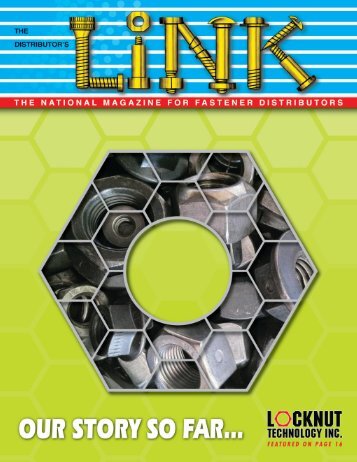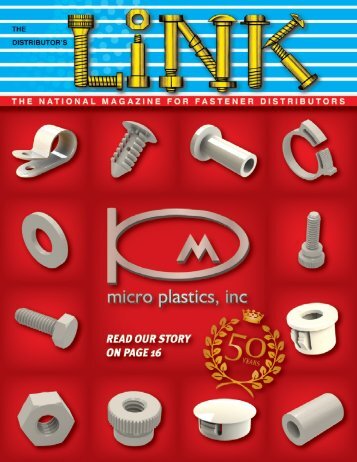FALL 2014
- Text
- Fastener
- Fasteners
- Products
- Manufacturing
- Industrial
- Industries
- Requirements
- Bolt
- Rivet
- Distributors
48 THE DISTRIBUTOR’S
48 THE DISTRIBUTOR’S LINK Jim Truesdell James Truesdell is president of Brauer Supply Company, a distributor of specialty fasteners, insulation, air filtration, and air conditioning with headquarters in St. Louis. Mr. Truesdell is adjunct professor at Saint Louis University and Webster University. An attorney and frequently published writer, he is the author of “Total Quality Management: Reports From the Front Lines”. EFFORTS CONTINUE TO CURB PATENT TROLLS Every now and then, as a distributor of industrial fasteners and hardware goods, I am the recipient of an email or letter correspondence alerting me that I may have violated the patent of someone who purports to own the rights to some item or tool which we are allegedly selling or which we have secured from some manufacturer who they charge is not the rightful owner of the item in question. Sometimes these claims have been directed at a specific instance. More usually they are broad assertions of usage which lack documentation and appear to be a shotgun style communication to a vast number of companies which the sender seems to be shaking down for a “settlement.” It’s not always just the manufacturer who is targeted by these entities which have become known by the term “patent troll.” Our patent laws exist because we want to encourage creativity and innovation in coming up with new and unique inventions which will serve our society. The idea is to allow those who invest time and effort in research and development a period of time during which they can exclude others from utilizing the new idea unless those others negotiate and pay license fees and royalties to the inventor/developer. It is all logical and for many years has worked reasonably well to stimulate ingenuity and the entrepreneurial spirit in our economy. But like so many things that have good intent, there are people who will look for an “angle” and find a way to twist the law’s application so that they can extract money from someone else. Such is the proliferating problem of “patent trolls.” Evoking the image of the ugly green monster that lurked under bridges in fairy tale stories and who demanded payment of toll fees from those seeking to cross the bridge, there are entities out there who acquire patents through various means and seek out victims who may be using similar devices or processes (however remotely) and then threaten to file lawsuits for which they seek a settlement payment. These patent pirates, more gently referred to as “patent holding companies”, do not actively manufacture product or provide services. They sometimes purchase patents from bankrupt companies and then enforce them against third parties without even the pretense of actually using the patents themselves. Many of the patents the trolls use probably shouldn’t have been granted in the first place. Many of them are vague and overbroad. There have been calls from many in business and government to narrow the criteria on which they are issued. President Obama, in signing the “America Invents Act” in 2013 called on the Patent and Trademark Office to hold patent holders’ “feet to the fire” in considering applications. One area that seems to have been abused is where software is developed to provide new processes to implement already established ideas and products. In fact, the Supreme Court has moved in recent months to limit these suits. In the case of Alice Corp. vs. CLS Bank Justice Clarence Thomas, writing for the majority, said that the patent holders use of software and computers to implement an already established practice (in this case completing financial trades through an intermediary to guard against fraud) did not constitute an actual invention. Another case, Octane Fitness vs. Icon Health & Fitness, made it easier for courts to compel the loser of a lawsuit to pay a defendant’s attorney’s fees if a judge deems a lawsuit frivolous. This is important because unscrupulous plaintiffs often leverage the fact that they are litigating under contingency legal fee agreements which allows them to proceed without risk while defendants are racking up hourly defense bills, giving those defendants a great incentive to throw money into a settlement for even a non-meritorious claim. please turn to page 212
- Page 8: 6 THE DISTRIBUTOR’S LINK The Gilc
- Page 12: 10 THE DISTRIBUTOR’S LINK Guy Ave
- Page 26: 24 THE DISTRIBUTOR’S LINK NATIONA
- Page 30: 28 THE DISTRIBUTOR’S LINK Don Con
- Page 34: 32 THE DISTRIBUTOR’S LINK Fascomp
- Page 37 and 38: THE DISTRIBUTOR’S LINK 35 KEY BEL
- Page 40: 38 THE DISTRIBUTOR’S LINK Dennis
- Page 44: 42 THE DISTRIBUTOR’S LINK Industr
- Page 47 and 48: THE DISTRIBUTOR’S LINK 45
- Page 52: 50 THE DISTRIBUTOR’S LINK Slip-ON
- Page 55 and 56: THE DISTRIBUTOR’S LINK 53 Parker
- Page 58: 56 THE DISTRIBUTOR’S LINK Spirol
- Page 64: 62 THE DISTRIBUTOR’S LINK Interna
- Page 67 and 68: THE DISTRIBUTOR’S LINK 65 Arser i
- Page 70: 68 THE DISTRIBUTOR’S LINK Nationa
- Page 74: 72 THE DISTRIBUTOR’S LINK Investm
- Page 78 and 79: 76 THE DISTRIBUTOR’S LINK Anthony
- Page 80: 78 THE DISTRIBUTOR’S LINK PWFA -
- Page 84 and 85: 82 THE DISTRIBUTOR’S LINK Cardina
- Page 86: 84 THE DISTRIBUTOR’S LINK John R.
- Page 90: 88 THE DISTRIBUTOR’S LINK MW Indu
- Page 93 and 94: THE DISTRIBUTOR’S LINK 91 Your re
- Page 96 and 97: 94 THE DISTRIBUTOR’S LINK Interco
- Page 98: 96 THE DISTRIBUTOR’S LINK AUGUST
- Page 102:
100 THE DISTRIBUTOR’S LINK MFDA -
- Page 106 and 107:
104 THE DISTRIBUTOR’S LINK MWFA -
- Page 108 and 109:
106 THE DISTRIBUTOR’S LINK FTI -
- Page 110 and 111:
108 THE DISTRIBUTOR’S LINK Eckart
- Page 112:
110 THE DISTRIBUTOR’S LINK NEFDA
- Page 118 and 119:
116 THE DISTRIBUTOR’S LINK MAFDA
- Page 120:
MWFA 33rd ANNUAL FASTENER SHOW ELK
- Page 124 and 125:
122 THE DISTRIBUTOR’S LINK Rotor
- Page 126 and 127:
124 THE DISTRIBUTOR’S LINK THE BI
- Page 128:
126 THE DISTRIBUTOR’S LINK NFDA -
- Page 131 and 132:
THE DISTRIBUTOR’S LINK 129 We are
- Page 133:
THE DISTRIBUTOR’S LINK 131
- Page 140 and 141:
138 THE DISTRIBUTOR’S LINK NCFA -
- Page 142 and 143:
140 THE DISTRIBUTOR’S LINK Sems a
- Page 144:
142 THE DISTRIBUTOR’S LINK SFA -
- Page 147 and 148:
THE DISTRIBUTOR’S LINK 145
- Page 150:
148 THE DISTRIBUTOR’S LINK Commun
- Page 153 and 154:
THE DISTRIBUTOR’S LINK 151
- Page 156:
154 THE DISTRIBUTOR’S LINK MWFA -
- Page 159 and 160:
THE DISTRIBUTOR’S LINK 157
- Page 162:
160 THE DISTRIBUTOR’S LINK Cable
- Page 165 and 166:
THE DISTRIBUTOR’S LINK 163
- Page 168:
166 THE DISTRIBUTOR’S LINK SEFA -
- Page 171 and 172:
THE DISTRIBUTOR’S LINK 169 Sherex
- Page 173 and 174:
THE DISTRIBUTOR’S LINK 171
- Page 175 and 176:
MF Supply, a woman owned and operat
- Page 180 and 181:
178 THE DISTRIBUTOR’S LINK IS SEO
- Page 182:
180 THE DISTRIBUTOR’S LINK INxSQL
- Page 185:
THE DISTRIBUTOR’S LINK 183
- Page 189:
THE DISTRIBUTOR’S LINK 187 Full L
- Page 197 and 198:
THE DISTRIBUTOR’S LINK 195 Lindst
- Page 199 and 200:
THE DISTRIBUTOR’S LINK 197
- Page 202:
200 THE DISTRIBUTOR’S LINK NEW SY
- Page 205 and 206:
THE DISTRIBUTOR’S LINK 203 SPIROL
- Page 207 and 208:
THE DISTRIBUTOR’S LINK 205 SAVING
- Page 210 and 211:
208 THE DISTRIBUTOR’S LINK THE AR
- Page 212:
210 THE DISTRIBUTOR’S LINK THE BU
- Page 215 and 216:
THE DISTRIBUTOR’S LINK 213 Tector
- Page 218:
216 THE DISTRIBUTOR’S LINK HOW TO
- Page 221 and 222:
THE DISTRIBUTOR’S LINK 219 Roger
- Page 224:
222 THE DISTRIBUTOR’S LINK FASTEN
- Page 228 and 229:
226 THE DISTRIBUTOR’S LINK ECKART
- Page 230 and 231:
228 THE DISTRIBUTOR’S LINK WHY A
- Page 232 and 233:
230 THE DISTRIBUTOR’S LINK FASTEN
- Page 234:
232 THE DISTRIBUTOR’S LINK SOCIAL
- Page 237 and 238:
MWFA 62nd ANNUAL GOLF OUTING EAGLEW
- Page 239 and 240:
THE DISTRIBUTOR’S LINK 237 Labora
- Page 241 and 242:
MWFA 62nd ANNUAL GOLF OUTING EAGLEW
- Page 243 and 244:
THE DISTRIBUTOR’S LINK 241
- Page 245 and 246:
WHAT THE UAW ELECTION AT VOLKSWAGEN
- Page 247 and 248:
THE DISTRIBUTOR’S LINK 245 Bay Ma
- Page 249 and 250:
THE DISTRIBUTOR’S LINK 247 ISO 90
- Page 252:
250 THE DISTRIBUTOR’S LINK WHAT T
- Page 255 and 256:
THE DISTRIBUTOR’S LINK 253 FASTEN
Inappropriate
Loading...
Mail this publication
Loading...
Embed
Loading...
|
SHARE A PAGE FROM THIS MAGAZINE OPTION 1: Click on the share tab above, or OPTION 2: Click on the icon (far right of toolbar) and then click on the icon (far right of toolbar) and then click on the  icon (top right of the page). icon (top right of the page).
|
View Archives
Copyright © Distributor's Link, Inc. All Rights Reserved | Privacy Policy






